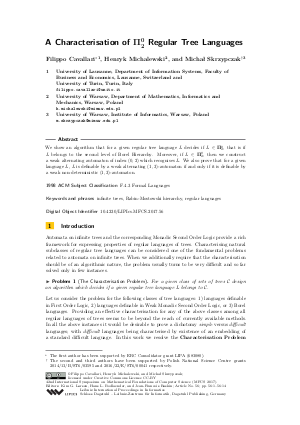A Characterisation of Pi^0_2 Regular Tree Languages
Authors Filippo Cavallari, Henryk Michalewski, Michal Skrzypczak
-
Part of:
Volume:
42nd International Symposium on Mathematical Foundations of Computer Science (MFCS 2017)
Part of: Series: Leibniz International Proceedings in Informatics (LIPIcs)
Part of: Conference: Mathematical Foundations of Computer Science (MFCS) - License:
 Creative Commons Attribution 3.0 Unported license
Creative Commons Attribution 3.0 Unported license
- Publication Date: 2017-12-01
File

PDF
LIPIcs.MFCS.2017.56.pdf
- Filesize: 0.55 MB
- 14 pages
Document Identifiers
Subject Classification
Keywords
- infinite trees
- Rabin-Mostowski hierarchy
- regular languages
Metrics
- Access Statistics
-
Total Accesses (updated on a weekly basis)
0PDF Downloads0Metadata Views
Abstract
We show an algorithm that for a given regular tree language L decides if L is in Pi^0_2, that is if L belongs to the second level of Borel Hierarchy. Moreover, if L is in Pi^0_2, then we construct a weak alternating automaton of index (0, 2) which recognises L. We also prove that for a given language L, L is recognisable by a weak alternating (1, 3)-automaton if and only if it is recognisable by a weak non-deterministic (1, 3)-automaton.
Cite As Get BibTex
Filippo Cavallari, Henryk Michalewski, and Michal Skrzypczak. A Characterisation of Pi^0_2 Regular Tree Languages. In 42nd International Symposium on Mathematical Foundations of Computer Science (MFCS 2017). Leibniz International Proceedings in Informatics (LIPIcs), Volume 83, pp. 56:1-56:14, Schloss Dagstuhl – Leibniz-Zentrum für Informatik (2017)
https://doi.org/10.4230/LIPIcs.MFCS.2017.56
BibTex
@InProceedings{cavallari_et_al:LIPIcs.MFCS.2017.56,
author = {Cavallari, Filippo and Michalewski, Henryk and Skrzypczak, Michal},
title = {{A Characterisation of Pi^0\underline2 Regular Tree Languages}},
booktitle = {42nd International Symposium on Mathematical Foundations of Computer Science (MFCS 2017)},
pages = {56:1--56:14},
series = {Leibniz International Proceedings in Informatics (LIPIcs)},
ISBN = {978-3-95977-046-0},
ISSN = {1868-8969},
year = {2017},
volume = {83},
editor = {Larsen, Kim G. and Bodlaender, Hans L. and Raskin, Jean-Francois},
publisher = {Schloss Dagstuhl -- Leibniz-Zentrum f{\"u}r Informatik},
address = {Dagstuhl, Germany},
URL = {https://drops.dagstuhl.de/entities/document/10.4230/LIPIcs.MFCS.2017.56},
URN = {urn:nbn:de:0030-drops-80683},
doi = {10.4230/LIPIcs.MFCS.2017.56},
annote = {Keywords: infinite trees, Rabin-Mostowski hierarchy, regular languages}
}
Author Details
References
-
Mikołaj Bojańczyk and Thomas Place. Regular languages of infinite trees that are Boolean combinations of open sets. In ICALP, pages 104-115, 2012.

-
Julius Richard Büchi and Lawrence H. Landweber. Solving sequential conditions by finite-state strategies. Transactions of the American Mathematical Society, 138:295-311, 1969.

-
Thomas Colcombet. Fonctions régulières de coût. Habilitation thesis, Université Paris Diderot - Paris 7, 2013.

-
Thomas Colcombet, Denis Kuperberg, Christof Löding, and Michael Vanden Boom. Deciding the weak definability of Büchi definable tree languages. In CSL, pages 215-230, 2013.

-
Thomas Colcombet and Christof Löding. The non-deterministic Mostowski hierarchy and distance-parity automata. In ICALP (2), pages 398-409, 2008.

-
Jacques Duparc and Filip Murlak. On the topological complexity of weakly recognizable tree languages. Fundamentals of computation theory, 2007.

-
Alessandro Facchini and Henryk Michalewski. Deciding the Borel complexity of regular tree languages. In CiE 2014, pages 163-172, 2014.

-
Alessandro Facchini, Filip Murlak, and Michał Skrzypczak. Index problems for game automata. ACM Trans. Comput. Log., 17(4):24:1-24:38, 2016.

-
Tomasz Gogacz, Henryk Michalewski, Matteo Mio, and Michał Skrzypczak. Measure properties of game tree languages. In MFCS, pages 303-314, 2014.

-
Erich Grädel, Wolfgang Thomas, and Thomas Wilke, editors. Automata, Logics, and Infinite Games: A Guide to Current Research, volume 2500 of Lecture Notes in Computer Science. Springer, 2002.

-
Alexander Kechris. Classical descriptive set theory. Springer-Verlag, New York, 1995.

-
Denis Kuperberg and Michael Vanden Boom. Quasi-weak cost automata: A new variant of weakness. In FSTTCS, volume 13 of LIPIcs, pages 66-77, 2011.

-
Orna Kupferman and Moshe Y. Vardi. The weakness of self-complementation. In STACS, pages 455-466, 1999.

-
Christof Löding. Logic and automata over infinite trees. Habilitation thesis, RWTH Aachen, Germany, 2009.

-
Satoru Miyano and Takeshi Hayashi. Alternating finite automata on omega-words. Theor. Comput. Sci., 32:321-330, 1984.

-
Filip Murlak. The Wadge hierarchy of deterministic tree languages. Logical Methods in Computer Science, 4(4), 2008.

-
Damian Niwiński and Igor Walukiewicz. A gap property of deterministic tree languages. Theor. Comput. Sci., 1(303):215-231, 2003.

-
Damian Niwiński and Igor Walukiewicz. Deciding nondeterministic hierarchy of deterministic tree automata. Electr. Notes Theor. Comput. Sci., 123:195-208, 2005.

-
Dominique Perrin and Jean-Éric Pin. Infinite Words: Automata, Semigroups, Logic and Games. Elsevier, 2004.

-
Michael Oser Rabin. Decidability of second-order theories and automata on infinite trees. Trans. of the American Math. Soc., 141:1-35, 1969.

-
Michael Oser Rabin and Dana Scott. Finite automata and their decision problems. IBM Journal of Research and Development, 3(2):114-125, April 1959.

-
Michał Skrzypczak. Descriptive Set Theoretic Methods in Automata Theory - Decidability and Topological Complexity, volume 9802 of Lecture Notes in Computer Science. Springer, 2016.

-
Michał Skrzypczak and Igor Walukiewicz. Deciding the topological complexity of Büchi languages. In ICALP (2), pages 99:1-99:13, 2016.

-
Jerzy Skurczyński. The Borel hierarchy is infinite in the class of regular sets of trees. Theoretical Computer Science, 112(2):413-418, 1993.

-
Wolfgang Thomas. Languages, automata, and logic. In Handbook of Formal Languages, pages 389-455. Springer, 1996.

-
Wolfgang Thomas and Helmut Lescow. Logical specifications of infinite computations. In REX School/Symposium, pages 583-621, 1993.

-
Boris A. Trakhtenbrot. Finite automata and the monadic predicate calculus. Siberian Mathematical Journal, 3(1):103-131, 1962.

